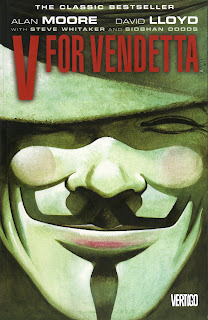 his strength from this exclusion. But it occurs to me that V also serves as a sort of fun-house mirror to the state, reflecting the enjoyment of its own extra legal excess, an excess that the law must actively disavow in order to function. Moreover, his 'vendetta', which gives title to the novel, does not seem to be without a certain pleasure on his part.
his strength from this exclusion. But it occurs to me that V also serves as a sort of fun-house mirror to the state, reflecting the enjoyment of its own extra legal excess, an excess that the law must actively disavow in order to function. Moreover, his 'vendetta', which gives title to the novel, does not seem to be without a certain pleasure on his part.V's frozen smile serves as a quick short-hand for his enjoyment--he is a figure who enjoys all the time, who can do nothing but enjoy. Other signals in the novel support this conclusion. V is identified with popular culture, songs, art and otherwise banned works. He houses those cultural treasures he is able to recover in his underground 'shadow-gallery', a strange sort of fun-house that speaks to undercurrents on libidinal investment in his mission (perhaps I'll write more on the gallery in a later post). In every instance, V identifies with significations of forbidden excess, even as he seems to embody a structural void or lack that sets in motion Evey's desire.
One of the tropes he draws on most frequently is that of performance, a tendency which in the 'Vaudeville' section (31-36) has some bearing on his 'fun-house' mirroring of the state and V's own enjoyment of his excessive position. In this sequence, V has kidnapped Commander Prospero, the voice of 'Fate' and a former guard at the Larkhill detention facility. Taking him back to the shadow gallery, V, dressed in his vaudeville 'punch and judy' costume, terrorizes Prospero by leading him through a stage
 mock-up of the facility. V ends this farce by incinerating Propspero's antique dolls collection in an oven (returning to the fire motif). V's 'distortion' of the facility actually reflects its disavowed truth.
mock-up of the facility. V ends this farce by incinerating Propspero's antique dolls collection in an oven (returning to the fire motif). V's 'distortion' of the facility actually reflects its disavowed truth.Since this section is ambiguous, let's break it down into the two readings that it condenses.
In the first reading, V, in recreating the conditions of his imprisonment, holds up the mirror to the law, confronting it with its obscene excesses. V points out the pleasure Prospero used to take in his obscene position: 'I remember you used to call out to us sometimes. Little jokes. You had a special name for the medical block. You used to call it the funny farm' (34.5). The joke is however a sick one, as V demonstrates through the destruction of the dolls in the oven. Prospero, who vehemently protests, values plastic and porcelain over flesh and blood. The hidden truth of this sequence is that in operating the ovens at Larkhill, Prospero had reduced living humans to his playthings, something trivial and disposable. V thus confronts him with his own perverse enjoyment.
In the second reading, it is difficult to deny that V's expression suggests that he is enjoying his psychological torture of Prospero. He dresses up as a grotesque figure with a frozen smile whose goal is to torment Propspero and to remind him of V's suffering in the 'medical compound'. He stages an elaborate show simply to punish a man who once punished him. Undoubtedly, his vendetta, which focuses largely on those who worked at Larkhill, speaks to a personal enjoyment of revenge, which is as much a motivating factor as his concern for society as a whole.
Yet, herein rests the wisdom of V's portrayal as an inscrutable void: the ambiguity of his position cannot really be resolved. Does he work for the good of society, or does he work for his own good? Does he hold up the mirror to power, or does he mirror his own desire? What does Moore intend to say by the overlap of these excesses in both state power and revolutionary power?

V's mask also disengages him from actual expression, since he could be repulsed/ambivalent for all we know, frowning under his disguise. Another function of the mask is to further traumatize his state-affiliated victims in a powerful form of vengeance which deploys his _perceived_ enjoyment; Lacan asserts the enjoyment of the Other is a torment, and in Moore we see it at the root of racism, ideological conflict, crime and punishment.
ReplyDelete